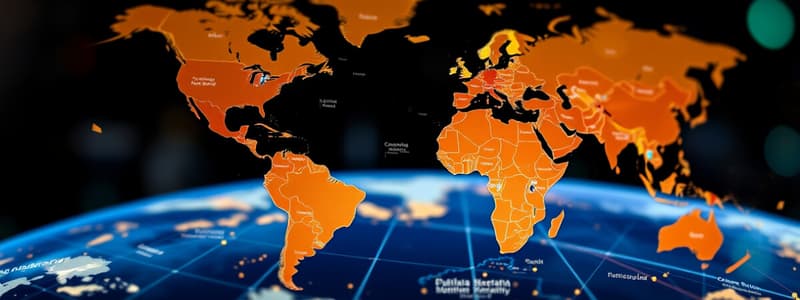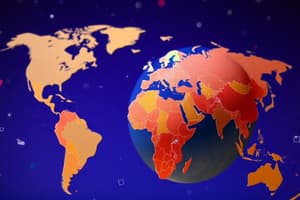Podcast
Questions and Answers
What does globalization primarily involve?
What does globalization primarily involve?
- The isolation of nations from global interactions.
- The independence of local economies from foreign influence.
- The exchange of goods, services, and culture among countries. (correct)
- The limitation of trade and travel between regions.
Which aspect of globalization emphasizes the spread of cultural practices across borders?
Which aspect of globalization emphasizes the spread of cultural practices across borders?
- Technological Globalization
- Cultural Globalization (correct)
- Political Globalization
- Economic Globalization
What is a significant challenge posed by globalization?
What is a significant challenge posed by globalization?
- Cultural diversity among nations.
- Technological advancements that promote collaboration.
- Environmental degradation due to increased consumption. (correct)
- Global communication and travel improvements.
Which indicator is NOT typically used to measure globalization?
Which indicator is NOT typically used to measure globalization?
What is a critique of globalization related to labor in developing countries?
What is a critique of globalization related to labor in developing countries?
Flashcards are hidden until you start studying
Study Notes
Definition of Globalization
- The process of increasing interconnectedness and interdependence among countries.
- Involves the exchange of goods, services, information, and culture.
Key Aspects of Globalization
-
Economic Globalization
- Expansion of international trade and investment.
- Emergence of global markets and multinational corporations.
- Impact of global supply chains and outsourcing.
-
Cultural Globalization
- Spread of ideas, values, and cultural practices across borders.
- Influence of global media, travel, and the internet.
- Hybridization of cultures and potential loss of local identities.
-
Political Globalization
- Growth of international political institutions (e.g., UN, WTO).
- Influence of global governance and treaties on national policies.
- Rise of transnational movements and non-state actors.
-
Technological Globalization
- Rapid advancement in communication and transportation technologies.
- Role of the internet and digital platforms in connecting people globally.
- Innovations that facilitate global collaboration and trade.
Benefits of Globalization
- Economic growth and access to larger markets.
- Enhanced cultural exchange and diversity.
- Sharing of technology and knowledge.
Challenges of Globalization
- Economic inequality within and between countries.
- Cultural homogenization and loss of local traditions.
- Environmental concerns due to increased production and consumption.
- Political tensions as countries navigate global interdependencies.
Globalization Indicators
- Trade volume and foreign direct investment (FDI) levels.
- Migration patterns and cross-border workforce mobility.
- Use of technology and internet connectivity rates.
Critiques of Globalization
- Advocates for protectionism argue it undermines local industries.
- Critics highlight exploitation of labor in developing countries.
- Concerns about the sovereignty of nations and cultural imperialism.
Definition of Globalization
- Increasing interconnectedness and interdependence among countries.
- Involves exchanges of goods, services, information, and culture.
Key Aspects of Globalization
-
Economic Globalization
- Growth of international trade and investment.
- Rise of global markets and multinational corporations.
- Development of global supply chains and outsourcing practices.
-
Cultural Globalization
- Proliferation of ideas, values, and cultural practices across borders.
- Significant impact of global media, travel, and the internet.
- Hybridization of cultures may lead to the erosion of local identities.
-
Political Globalization
- Emergence of international political institutions like the UN and WTO.
- Global governance and treaties affect national policies.
- Rise of transnational movements and influence of non-state actors.
-
Technological Globalization
- Rapid advances in communication and transportation technologies.
- Internet and digital platforms play a critical role in global connections.
- Innovations enhance global collaboration and trade operations.
Benefits of Globalization
- Economic growth through access to larger markets.
- Cultural exchange fosters diversity and enrichment.
- Sharing of technology and knowledge boosts development.
Challenges of Globalization
- Economic disparities within and among countries exacerbate inequality.
- Cultural homogenization threatens local traditions and identities.
- Environmental issues arise from increased production and consumption activities.
- Political tensions emerge as countries manage complex global interdependencies.
Globalization Indicators
- Growth in trade volume and foreign direct investment (FDI) ratios.
- Migration patterns reflect cross-border workforce mobility trends.
- Increasing technology use and internet connectivity levels signify globalization.
Critiques of Globalization
- Protectionism advocates argue globalization harms local industries.
- Labor exploitation issues are highlighted in developing regions.
- Concerns about national sovereignty and cultural imperialism arise from increasing global influence.
Studying That Suits You
Use AI to generate personalized quizzes and flashcards to suit your learning preferences.




